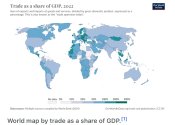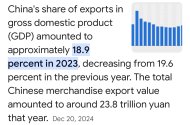The fact is that China makes a lot of shit. Therefore China is the PRODUCER. (Obviously China has a lot of consumption, but in aggregate China is a net exporter so the country is more of a producer than it is a consumer)
The fact is also that the US consumes a lot of shit (as much as people here circle jerk to how ASEAN is China's biggest trading partner, a lot of that is just rerouted Chinese trade with the US). Therefore the US is the CONSUMER.
If a PRODUCER gives away all of its producer surplus to the CONSUMER - i.e China gives away all of its producer surplus to the US. GDP is a measurement of VALUE ADD at MARKET prices - meaning yes even if China somehow made all the value, it gave it away for free to its customers and therefore China did not capture said value.
How in any way/shape/form is this beneficial to China?
Being an exceptional producer gives you an automatic advantage in domestic consumption too. It’s two sides of the same coin.
High productivity usually leads to intense competition between businesses and cost efficiency, so more buyers can afford more products.
Businesses also stay profitable and don’t go under because of economies of scale and supportive government policies.
This isn’t about inflated monetary values, like paying for one item at the price of ten in the US. It’s about actual, tangible goods—figuratively speaking, ten different items for the same cost.
That’s why you see "deflation" in China. Their economy is based on how many physical things people buy, unlike the US, where nominal GDP relies on inflated costs for insurance, healthcare, housing, transportation, utilities, childcare and education— increasing expenses charged by what feels like PE feudal lords.
In China, most of those basics services are either nearly free or affordable. These issues aren’t even topics of debate there.
So, the nominal GDP is useless for measuring both individual economic quality of life per capita and comprehensive national economic power too.
The only reason why Westoids redditors are taught to favor this crude foolish metric is because it is oligarch - friendly, justifying the total decay, presenting it even audaciously as something good. Wake up to reality.
Use your intuition, will charging higher price for some same service, thanks to market cornering, getting more profits for shareholder buybacks - lead to higher, increasing real wages, or opening a new factory will lead to it? Which kind of GDP comp. and growth is better for individual life?
For the other part of your "argument", about 60% of what China produces is consumed domestically. Exporting surplus production is normal.
The dollars China gets from the US, for example, are still useful for buying things globally—otherwise, why would they sell? They’re not giving anything away for free.
Throughout history, every healthy empire has produced more than it consumes to accumulate some surplus gold.
That’s the foundation of growth and exactly what early capitalists recommended and the same principles that drove the West’s development in the first place.
Adherence to UNSNA has caused a breakdown in the meaning of GDP. As necessary services become an ever larger share of Western economies, their growth does not appear to result in discernable improvements in living standards.
Are US healthcare and universities twice as good as they were in the year 2000? If US households have not gotten vastly improved healthcare, education, housing and childcare over the past two decades, then inflation has been systematically underreported and GDP growth may have, in fact, been less than 1% per annum (instead of 2%), which equals stagnation given 0.8% per annum population growth. This may go a long way in explaining popular anger and the meltdown of American politics.
China’s material-focused GDP may be a better measure of the economy as it relates to living standards, especially since UNSNA has obviously lost its mind by now officially recommending drugs, prostitution, illegal gambling and theft be included in GDP.
Similarly, analysts who lament that China accounts for 30% of the world’s manufacturing output but only 13% of household consumption are far off the mark. China accounts for 20-40% of global demand for just about every consumer product but much of the services it consumes have been left out of national accounts.
But after shopping for cars, buying a domestic brand carbon fiber road bike with all the bells and whistles for $2,600 (equivalent to a $15,000 Trek), paying $7.65 for Bluetooth earphones (much better than the $250 PowerBeats Pro they replaced), renting cars for $20 a day, staying at boutique hotels for $30 a night, buying an extremely solid heavy duty umbrella for $2.20 (and losing it right away) and undergoing an unfortunate series of medical interventions (both major and minor) for less than the deductible on expat health insurance and getting white glove customer service for the smallest of purchases, Han Feizi’s mental map of price and value has crumbled.
No, the ICP did not do a lousy job. They were hamstrung by the initial conditions that China’s NBS subjected them to. And the data released in 2024 was taken in 2021 – ancient history in China. The recent ICP adjustment of a few percentage points in China’s PPP GDP relative to the US elicited consternation from the NBS.
But the reality is an accurate adjustment would be of a multiple or two.


